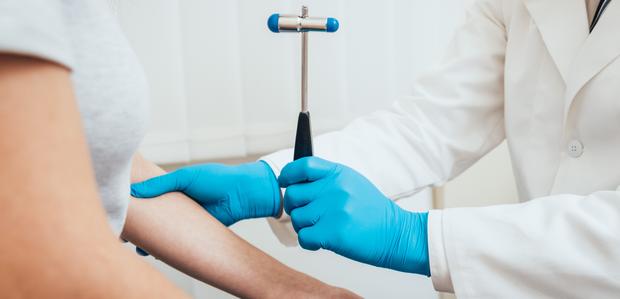Department of Rheumatology

Rheumatology is the branch of medicine that deals with Arthritis, and other disorders of the Joints, Muscles, and Ligaments. A Rheumatologist is trained in the diagnosis and treatment of Musculoskeletal Disease and Systemic Autoimmune conditions.
The Department of Rheumatology at Gleneagles Hospitals, India takes a multidisciplinary approach to the treatment of Rheumatic Diseases. Largely associated with the elderly, Rheumatic Diseases have now begun to affect certain young individuals as well. A common Rheumatic Disease is Rheumatoid Arthritis – an autoimmune disease that causes Joint Inflammation and Pain.
The Rheumatology Department offers a wide range of services to patients for Diagnosis and Treatment of Joint, Bone and Connective Tissue Diseases. Providing comprehensive and individually tailored treatment plans, the department seeks to fuse together Clinical Expertise, Research and State-of-the-Art Technologies.
Working with other specialities such as Orthopaedics, the Department of Rheumatology has successfully treated various forms of Rheumatic Disorders.
A number of treatments are offered at Gleneagles Hospitals for the following diseases:
- Dermatomyositis
- Juvenile Idiopathic Arthritis
- Osteoporosis
- Psoriatic Arthritis
- Scleroderma
- Systemic Lupus Erythematosus
WAYS TO PROTECT YOUR JOINTS
INCREASE FLEXIBILITY
When a joint is stiff, it causes inflammation and weakens the muscles protecting the joints. Stretching is the best way to keep your body flexible and maintain motion around the joints.
GET YOUR NUTRITION IN CHECK
Maintain a healthy diet by avoiding saturated fats and processed foods. Minimizing excess body fat and inflammatory responses are ways to ensure healthy muscles and joints.
WEAR THE RIGHT SHOES
Choosing the right shoes for your legs is very important as it provides cushioning, stability and comfort while walking. It's time to replace your worn-out shoes and find the right one.
MAINTAIN PROPER POSTURE
Practice a good posture as poor posture can lead to tightened, compromised muscles, and eventually back pain. Your posture affects your joints.
LISTEN TO YOUR JOINTS
Avoid being overactive and know when to stop certain movements. Sometimes, "no pain, no gain" can lead to problems if not addressed early. So, do not strain your joints.
WATCH YOUR WEIGHT
Keeping your weight within a healthy range is the best thing you can do for your joints. Exercise regularly and maintain your weight to reduce the pressure on your knees, hips and back.
BEST RHEUMATOLOGY HOSPITAL IN INDIA FOR RHEUMATIC DISEASES AND ARTHRITIS TREATMENT
Advanced facilities for Rheumatology with excellent diagnosis and affordable cost of Rheumatology Diseases in India
Gleneagles Hospitals, India is the best Rheumatology Hospital in India offering the best Arthritis treatment and care for all types of Rheumatology Diseases. Helmed by the best Rheumatologists in India, the hospital today is recognized for its exceptional care, accurate diagnosis and best treatment of Rheumatology conditions. The top Rheumatology Doctors in India, working in our hospital bring a wealth of experience and wide-ranging expertise that has helped us grow into the best Rheumatology Hospitals in India.
BRINGING THE LATEST TECHNOLOGIES FROM AROUND THE GLOBE FOR ACCURATE DIAGNOSIS AND TREATMENT OF DISEASES
Rheumatoid Diseases are often complex conditions and may be difficult to diagnose and treat. These are typically Autoimmune Diseases involving joints, and soft tissues such as Arthritis, Osteoarthritis, Gout, Lupus and others. The Department of Rheumatology at Gleneagles Hospitals offers comprehensive treatment and care for all Autoimmune Diseases. With excellent diagnostic methods and infrastructure, the department is one of the best facilities for the treatment of Rheumatoid conditions. The Department of Rheumatology provides treatment and intervention for the following diseases.
Why Choose Us
-
PATIENT EXPERIENCE
Your care and comfort are our top priorities. We ensure that the patients are well informed prior to every step we take for their benefit and that their queries are effectively answered.
-
LATEST TECHNOLOGIES
Your care and comfort are our top priorities. We ensure that the patients are well informed prior to every step we take for their benefit and that their queries are effectively answered.
-
PROVIDING QUALITY CARE
Your care and comfort are our top priorities. We ensure that the patients are well informed prior to every step we take for their benefit and that their queries are effectively answered.










